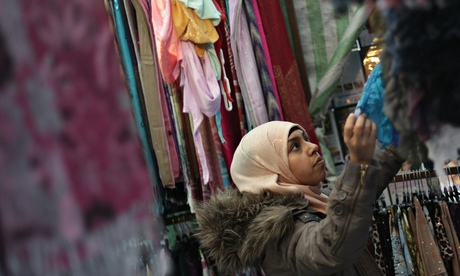Not all Muslims are jihadists – and it's a shame such reassurances are needed
by Sharif Nashashibi on 05-07-2014
| BRussells Tribunal |
Every survey that I have run, and surveys run by my academic colleagues, makes it quite clear that a significant proportion of the British population hold negative views of Islam, and by extension British Muslim communities

'Brits think Muslims make up 24% of the population, when the real percentage is about 5%.' Photograph: Dan Kitwood/Getty Images
 Since the militarisation of the Syrian revolution, there has been much reporting in the UK of British Muslims going to fight in Syria and now Iraq. The recent spike in coverage follows the publication of avideo by Isis, in which three British Muslims appeal for others to join their cause.
Since the militarisation of the Syrian revolution, there has been much reporting in the UK of British Muslims going to fight in Syria and now Iraq. The recent spike in coverage follows the publication of avideo by Isis, in which three British Muslims appeal for others to join their cause.
Of course jihadism arouses domestic alarm, particularly given the very real possibility of British Muslims returning radicalised and battle-hardened, and given the risk of them carrying out deadly attacks in the UK. The extent of media coverage is largely a reflection of such concerns, but it also gives the impression that the problem is far more widespread than it actually is.
Given the attention, one would be forgiven for thinking there is an exodus of British Muslims going to fight in the Middle East. This is far from reality, however. The government puts the number at about 500 – that constitutes less than 0.02% of the 2.7 million Muslims in this country. Inadvertently or otherwise, the pervasiveness of such media coverage has a strong and negative influence on British public perceptions of Muslims.
Prof Matthew Goodwin, a member of the cross-government Working Group on Anti-Muslim Hatred, said: "Every survey that I have run, and surveys run by my academic colleagues, makes it quite clear that a significant proportion of the British population hold negative views of Islam, and by extension British Muslim communities."
For example, a poll last year revealed that 60% of 18- to 24-year-olds in Britain thought the public had a negative image of Muslims, while 44% said Muslims did not share the same values as the rest of the population. More than a quarter distrusted Muslims, believed Britain would be better off with fewer of them, and thought Islam was not a peaceful religion. Less than a third believed Muslims were doing enough to tackle extremism.
A reaction to such negative perceptions is the constant need to reassure the public that the vast majority of British Muslims are "decent, law-abiding citizens". For example, words to that effect were repeated ad nauseam on the BBC's Question Time last week.
It should be a given that British Muslims are decent and law-abiding. The intention behind pointing this out is good, but the result is patronising. The majority of every religious community in Britain is decent and law-abiding, but it is only Muslims about which constant reassurances need to be given.
Misleading public perceptions around the niqab (a face veil revealing only the eyes) and the burqa (full-body cover) also give the impression that the number of women in Britain who wear these garments is far higher than it is. Statistics for Britain are hard to come by, but those available for other European countries – such as Belgium, Denmark, France, the Netherlands and Sweden – show how few Muslim women wear either garment. Nevertheless, hardly a week goes by without media coverage of Muslim female dress in Britain.
The abundance of reporting on Muslims also contributes to the impression that they represent a far higher proportion of the total British population than they do. According to an Ipsos Mori poll last year, Brits think Muslims make up 24% of the population, when the real percentage is about 5%.
Similarly, "the public think that 31% of the population are immigrants, when the official figures are 13%," Ipsos Mori wrote. This is hardly surprising given the amount of coverage of immigration.
It is natural that issues of national interest and concern – such as radicalisation, security and immigration – garner media attention. However, when covering such highly emotive topics, there should be an awareness that the media can be as powerful a tool to misinform – intentionally or otherwise, whether by the type or volume of content – as it can be to educate.
Sharif Hikmat Nashashibi is a journalist and commentator on Arab affairs. He is the recipient of an award from the International Media Council "for both facilitating and producing consistently balanced reporting" on the Middle East. He is a regular contributor to The Guardian, Al Arabiya, Al Jazeera English, The National, The Middle East magazine and the Middle East Eye, among other media outlets
No comments:
Post a Comment